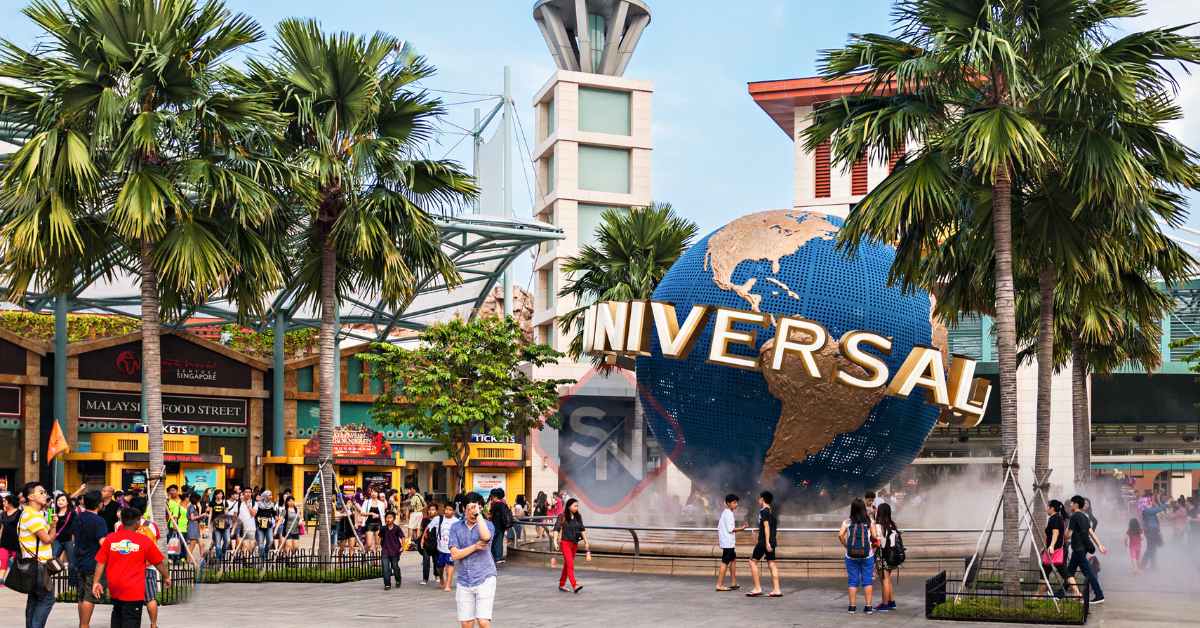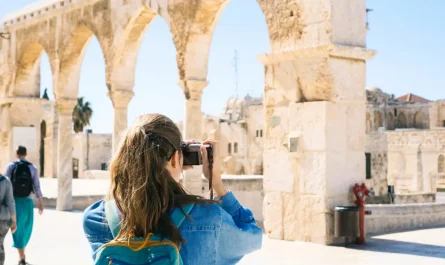I remember when booking a flight meant you’d automatically get a seat you could actually stretch in, a meal tray (even if it wasn’t great), and maybe a smile from the crew.
Fast forward to today, and that same legroom now lives behind a “premium economy” paywall. Across travel, the basics are quietly being rebranded as upgrades — from daily hotel housekeeping to onboard Wi-Fi — and we’re paying more for what used to be part of the ticket.
This quiet transformation, known as premium creep, is reshaping how airlines, hotels, and cruise lines make money — and how travelers perceive value. In this article, I’ll break down why this is happening, who benefits, and how you can still get more without paying extra.
The New Reality of Travel Pricing — Paying More for the Basics
I still remember when buying a flight ticket meant everything was included—the seat, the meal, the bag, even the smile. Today, the base price you see online is often just a teaser. Airlines, hotels, and cruise lines have learned a powerful trick: advertise low, then add later.
Across the industry, the “headline fare” has become a marketing tool. Airlines now sell “base fares” that don’t include luggage, meals, or seat selection. Want to check a bag or pick your seat? That’ll cost extra. Even budget carriers have mastered the art of showing rock-bottom prices and turning the rest into paid add-ons.
Hotels have followed the same playbook. Daily housekeeping, once standard, is now “on request” or “for a small fee.” Resort and destination fees—once limited to tropical getaways—now appear at city hotels from New York to Paris. Meanwhile, cruise lines quietly moved Wi-Fi, room service, and crew tips into “premium” bundles.
According to the U.S. Federal Trade Commission’s 2023 “junk-fee transparency” proposal, regulators are now pressing hotels and airlines to display the total price upfront. But until that happens, travelers remain trapped in a half-truth pricing world—one that looks cheaper than it really is.
Global inflation made things worse. As the International Monetary Fund (IMF) noted in its 2024 outlook, global travel and leisure prices rose faster than the overall consumer price index. Companies that didn’t want to raise base rates simply “unbundled” instead.
“Unbundling lets brands advertise the lowest entry price while monetizing comfort and convenience as optional luxuries.”
That single sentence explains why even basic comfort now feels like a privilege.
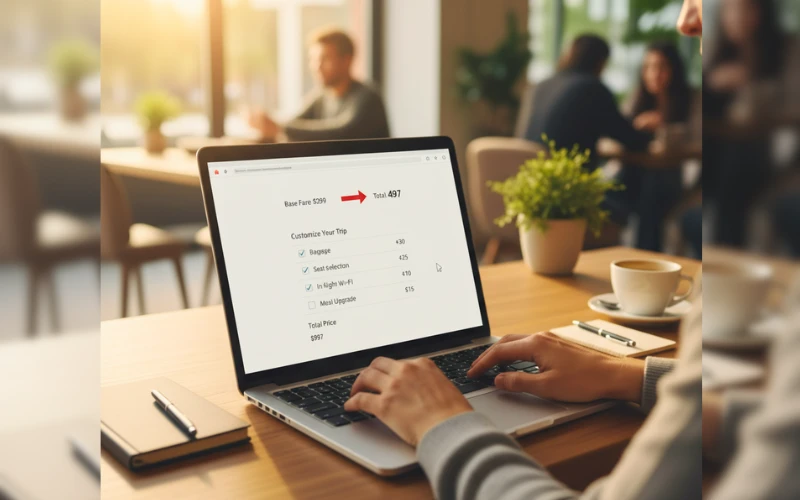
Why Companies Are Doing This — The Business Logic
From the outside, it feels unfair. But inside boardrooms, “premium creep” isn’t greed—it’s strategy.
After the pandemic, margins across airlines and hotels were razor-thin. Airlines realized that ancillary revenue—fees for seats, bags, and upgrades—made up more than 40 percent of total profit according to the IdeaWorksCompany / CarTrawler 2024 report. Why sell one $300 ticket when you can sell a $250 seat plus $75 of extras and still look cheaper online?
It’s also about psychology. Behavioral economists call it choice architecture—designing options that subtly nudge you to spend more. When the cheapest fare looks uncomfortable and the next tier promises “more comfort” for $30, most people click upgrade without a second thought.
Segmentation plays a part too. Not every traveler values the same things. Some want the lowest fare possible; others will pay for peace and privacy. Unbundling helps brands map and monetize each traveler’s “willingness to pay.”
Hotels are doing the same. Many large chains, including Marriott and Hilton, shifted daily housekeeping to an on-request service. According to Travel Weekly (2024), this change reduced labor costs and quietly created a new upsell opportunity—charging for what used to be standard.
Finally, there’s brand positioning. By labeling ordinary comforts as “premium,” companies create the illusion of choice and the feeling of exclusivity—even when nothing truly changed.
Are Travelers Really Getting More—or Just Paying More?
If you’ve been traveling for years, you can feel it — the difference between then and now.
What used to be “standard” comfort has quietly slipped into the “premium” tier.
| Feature | Then (2000s) | Now (2025) |
| Airline seat pitch | 33–34 inches | 30–31 inches (premium = 34–38″) |
| Checked bag | Included | Paid on most fares |
| Meals on flights | Standard | Buy-on-board or bundle-only |
| Hotel housekeeping | Daily | On request / Paid |
| Wi-Fi access | Free at many hotels | Paid tier or “premium speed” |
| Cruise Wi-Fi + drinks | All-included | In “Plus” or “Premier” bundles |
Take airlines: the price you see online rarely covers what you actually need. A “basic economy” ticket may look cheaper, but once you add a bag, seat, and snack, you’re close to what used to be standard pricing.
Hotels follow the same pattern — fewer inclusions, more add-ons. A 2024 CNBC report revealed that Marriott, Hilton, and Hyatt continue to treat daily cleaning as optional to reduce labor costs and charge extra for faster Wi-Fi or breakfast.
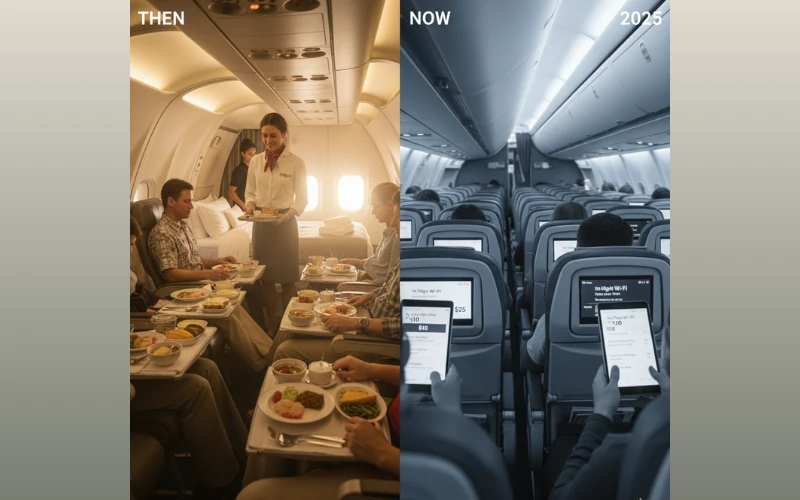
Travelers aren’t imagining it. According to the J.D. Power 2024 North America Airline Satisfaction Study, the top source of frustration is “added fees for essentials.”
And a Statista 2024 survey found that 70 % of travelers say hidden fees make them trust travel brands less.
“Choice isn’t the problem; shrinking value disguised as choice is.”
It’s not that the industry stopped innovating — premium experiences are better than ever. But the average traveler now pays more just to reach yesterday’s comfort level.
Industry Snapshots — Where Premium Creep Shows Up Most
Airlines :
Economy legroom has shrunk from 34 inches to about 30 inches on many carriers. Wi-Fi, seat selection, and even carry-on access can cost extra.
The IdeaWorksCompany CarTrawler 2024 Yearbook reports global airline ancillary revenue reached $117 billion, making up over 40 % of industry profit.
Hotels :
Chains like Marriott and Hilton shifted to on-request or paid housekeeping, while free breakfast disappeared from many mid-range brands.
The FTC’s proposed 2023 Junk Fee Transparency Rule aims to make hotels display the total price upfront, including resort or destination fees.
Cruises :
Cruise lines now bundle Wi-Fi, drinks, and crew tips into paid “Plus” or “Premier” packages. Onboard spending accounts for 40 %+ of total cruise revenue according to Cruise Industry News (2024).
Car Rentals :
The advertised price rarely reflects the final bill. Companies charge extra for GPS, toll devices, refueling, or additional drivers—even though most cars now include built-in navigation.
Vacation Rentals :
Platforms like Airbnb and Vrbo introduced cleaning and service fees that can add 25 – 30 % to a booking. After public pressure, Airbnb launched its “total price display” in 2023, showing fees upfront. Some hosts even charge for early check-in or late checkout.
The Consumer Perspective — What This Means for Travelers Like Us
I’ll be honest—my last trip was a wake-up call. The airfare looked cheap at first glance, but once I added one checked bag, selected a seat that wasn’t in the last row, and paid for onboard Wi-Fi so I could work mid-flight, the total jumped almost 40 percent.
By the time I reached the hotel, “early check-in” and “breakfast upgrade” had pushed the cost even higher. It wasn’t a luxury trip; it was just ordinary travel that became premium by default.
That’s the reality many of us face. Prices aren’t necessarily higher at first glance—they’re fragmented. Each comfort is now an extra line item. According to Skift Research (2024), the average leisure trip cost has increased by 25–30 percent since the pandemic, even when travelers think they’re booking the same level of comfort.
There are positives, of course. We can customize trips more than ever before—skip meals we don’t want, pay only for the perks we value, and build flexible itineraries. But there’s a downside: trust. When every “choice” feels like a hidden charge, it’s hard to believe brands that promise transparency.
The truth? Travelers haven’t suddenly become less price-sensitive; they’ve become more alert. We’ve learned to compare, calculate, and call out “value” that isn’t real.
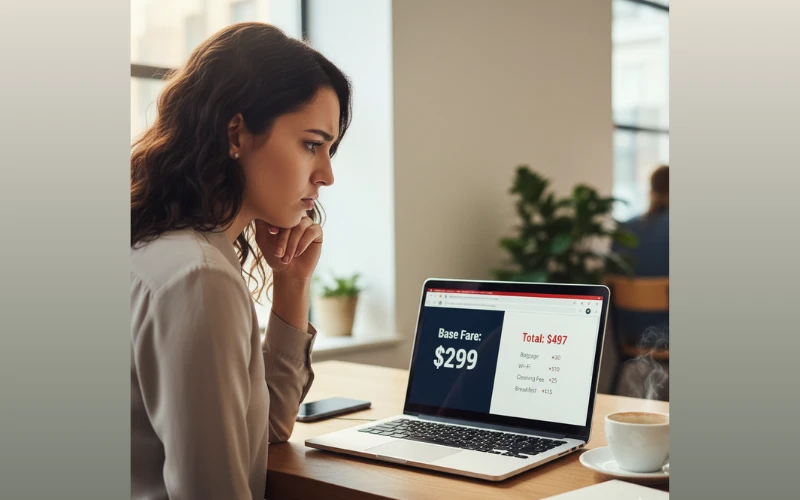
How to Outsmart Premium Creep
If premium creep is the new normal, the only winning move is to book smart.
Here’s what’s worked for me—and for travelers who’ve learned the game:
- Compare the total price, not the base fare.
Add baggage, Wi-Fi, resort fees, and transfers before deciding which option is cheaper. Sometimes the “expensive” one is actually fairer. - Check what’s included before booking.
Don’t assume breakfast, Wi-Fi, or housekeeping are standard anymore. Read the inclusions line by line.Use loyalty programs or co-branded cards.
Many airline and hotel cards offer free checked bags, Wi-Fi credits, or priority boarding—turning “extras” back into freebies. - Book direct whenever possible.
Direct bookings often give fee waivers, upgrade offers, or better cancellation terms than OTAs. - Travel off-season or mid-week.
Lower demand means better deals and higher upgrade chances—sometimes even free perks that feel genuinely premium. - Seek truly all-inclusive brands.
Some cruise lines, boutique resorts, and rail operators still offer transparent, bundled pricing. The total may look higher but covers almost everything. - Watch for new fee-disclosure laws.
The FTC’s Junk Fee Rule (2023) and similar EU regulations will soon force companies to display real total prices upfront. That’s a win for every traveler who’s ever been surprised at checkout.
Smart travelers don’t just compare prices—they compare honesty.
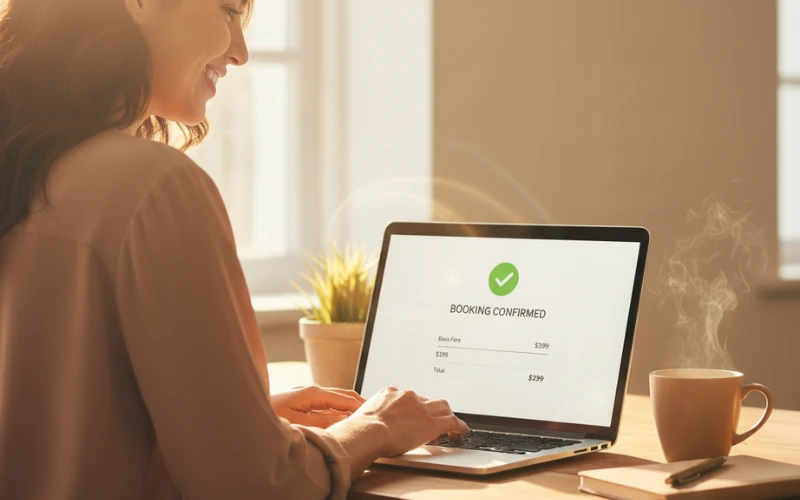
Redefining “Value” in Modern Travel
Premium creep isn’t disappearing anytime soon. It’s how the modern travel economy works—unbundled, optimized, and upsold at every click. But that doesn’t mean we’re powerless. Real value now comes from clarity, comfort, and control, not fancy labels or tiered names.
Personally, I’ve learned to pause before booking and ask: “What’s truly included?” That single question has saved me frustration, surprise charges, and more than a few dollars.
So maybe the new definition of “premium” isn’t about extra legroom or champagne service—it’s about transparency. And in 2025, that might be the most luxurious perk of all.
Disclaimer
This article is for informational purposes only. Travel prices, policies, and services may change over time, so readers are advised to check details directly with the provider before booking.
Contents
- 1 The New Reality of Travel Pricing — Paying More for the Basics
- 2 Why Companies Are Doing This — The Business Logic
- 3 Are Travelers Really Getting More—or Just Paying More?
- 4 Industry Snapshots — Where Premium Creep Shows Up Most
- 5 Airlines :
- 6 Hotels :
- 7 Cruises :
- 8 Car Rentals :
- 9 Vacation Rentals :
- 10 The Consumer Perspective — What This Means for Travelers Like Us
- 11 How to Outsmart Premium Creep
- 12 Redefining “Value” in Modern Travel
- 13 Disclaimer

